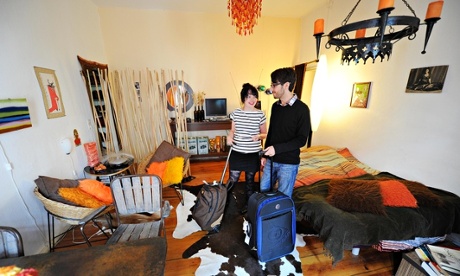
I realised recently that travellers to Melbourne have two options if they want to stay with me. They can find my Airbnb profile and pay $80 a night for the sunroom in our St Kilda apartment with fresh linen and breakfast guaranteed, or alternatively they can contact me via couchsurfing and come crash for free.
It got me thinking about how my personal priorities had shifted since I was a young couchsurfer travelling through Europe, the US and Australia about a decade ago. Back then there was a finely honed art in reading through scores of couchsurfing profiles for the next city or town on the itinerary and writing personal, genuine letters to the most appealing among them asking to stay at their place.
Today when I travel I prefer using Airbnb – partly because I usually have the finances to rent out an entire apartment in precisely the area I want to stay – but also because more often than not I will be looking for a place to write from, so I need to make the investment in getting a quiet comfortable work space.
But when it comes to hosting, I’ve come to realise that I much prefer accommodating couchsurfers than Airbnb guests.
There is something more authentically nomadic about couchsurfers – they are putting themselves out there at the whim of human kindness in a way most of us stop doing as adults. Plus, couchsurfers invariably have more interesting stories to share of hitchhiking across the country to be here, and they generally come with fewer expectations.
Put simply, the exchange becomes more human when money is taken out of the equation. The experience transcends the humdrum and can transport me back to the time when I too was a free solo traveller surviving off the kindness of strangers.
Any human interaction with strangers involves risks, as recent reports of an Italian couchsurfer drugging and raping hosts bear out. The key advice is to pay heed to the references your guests have accrued – and only take guests whose identity has been verified. In your initial online discussions with guests or hosts, insist on a level of honesty and simpatico before sealing the deal.
For those of us who spent nascent years roaming the planet when couchsurfing was in its prime, looking back at your own couchsurfing profile can be a confronting experience. Can many of us honestly claim to hold true to the idealism that originally drew us to this rather utopian, non-monetised travel portal?
Here is an extract from mine: “My mission is to participate in social change, love my friends, work for planet, and extend myself as a writer ... I like to explore, expand my horizons, look for the light while dipping toes in the dark, write to the world, and constantly expand my networks of close friends all over the world.”
Over more than 10 years and across 10 countries, I clocked up 34 positive references from people I stayed with and not a single negative one. People like Paul, the New York nudist and poly-pride activist who opened up his entire loft apartment in Kekalb Avenue to anyone who put in a request to stay with him, meaning his apartment housed up to 20 globally diverse travellers a night. Or Cashia, the Polish Greenpeace campaigner I stayed with in Warsaw and helped prepare food for the homeless through a Food Not Bombs stall she ran in Market Square. Or Dot and Roger, the progressive Christians who welcomed me and my boyfriend to stay with them in Portland, western Victoria, on a road trip back from Adelaide. They left out fresh eggs from the chickens in their backyard for us to make our own breakfast.
Couchsurfing tends to attract like-minded people whose values align with the idealism of the concept – but with pay-per-night accommodation sites, the transaction can become much more mercenary.
One would like to think that becoming a home owner doesn’t change us, but in reality it probably does. Since purchasing an apartment in St Kilda about two years ago I have kept my couchsurfing profile, but also decided with my partner to open our back room to Airbnb, Windu and Gay homestay guests to help cover the mortgage repayments.
A number of guests have stayed with us, but the exchanges were nothing like the breezy affinity I’d come to enjoy with fellow couchsurfers. Instead we had young couples from Adelaide who just wanted to come to St Kilda for a party weekend and seemed to prefer to keep their communication with us to an absolute minimum.
And we had an elderly Dutch couple who took one look at the size of the room and politely announced they would instead be finding a hotel down the road.
Of course some of the paying guests have been great, but what is noticeable is the heightened sense of entitlement the monetary transaction imbues. When accommodating these guests the apartment ceased to feel like our own home and took on the dimensions of a serviced apartment where homely liberties had to be forfeited.
No doubt these sites work brilliantly for people in different circumstances. Their practicality is determined by many factors, including the physical layout of your abode (whether you can offer a separate or semi-detached living space) and your financial needs. I’ll keep these profiles active for times when we are going away and want to rent out the entire apartment (this is a great aspect of such sites).
But we’ve made the decision to stop taking paying guests while we are in the apartment and just stick to hosting couchsurfers. I prefer the nature of the exchange that makes me feel like I’m part of a global community of people looking for meaningful travel experiences outside the mainstream, capitalist economy.
For me, couchsurfing always was about idealism. And like most ideals, it only works and becomes real when we make it so.

